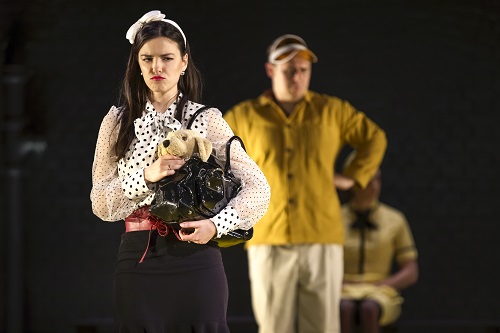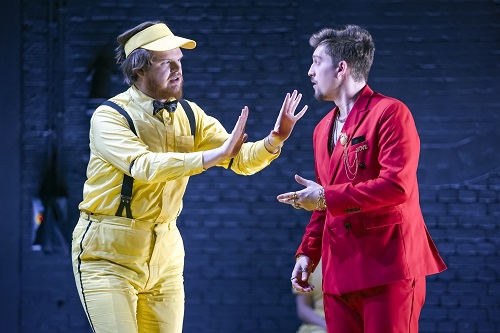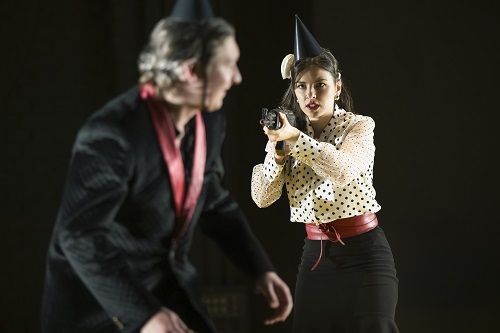This bright, bold and brisk production of Rossini’s La cambiale di matrimonio (The Marriage Contract) at the Royal Academy of Music confirmed one thing: that the 18-year-old Rossini knew what he was doing and simply carried on refining and perfecting the tricks of his trade for the next twenty years – in the process, initiating a golden age of Italian opera that ran through the bel canto years, on to Verdi and concluded with Puccini.
The composer’s fingerprints are evident throughout this lively, adroit score: the driving crescendos, the foot-on-the-pedal accelerandos, the sharp characterisation, the witty duets and frenzied ensembles. The fluency of the whole makes it sound ‘easy’, but the music makes demands on the vocalists. Some of the numbers look ahead, indirectly and directly, to what was to come. There’s a terrific duet for a pair of duelling baritones which would be a worthy model for Donizetti’s ‘Cheti, cheti, immantinente’ for Don Pasquale and Malatesta; and, there’s a showstopping soprano aria, the third section of which Rossini later milked for his Rosina-Figaro duet in Il barbiere.
La cambiale di matrimonio wasn’t Rossini’s first opera – he’d composed Demetrio e Polibio while still a school student – but it was the first to be staged, in the small Venetian Teatro San Moisè Opera on 3rd November 1810. The one-act farce, for six soloists and small orchestra, had been commissioned through friends of his parents when another composer failed to meet a delivery deadline. Rossini made use of an overture that he’d written a year earlier, and here it was given a chirpy reading by conductor Johann Stuckenbruck and the Royal Academy Sinfonia, setting the tone for light and lucid string textures, and fine horn and woodwind playing, that would characterise the instrumental playing throughout the performance. (This was the UK premiere of a new critical edition by Eleonora di Cintio.)

The libretto (by Gaetano Rossi, who would later provide Rossini with the texts of Semiramide and Trancredi) draws on commedia characters and situations. The action is set in England. Tobias Mill, a merchant, has been asked by his wealthy Canadian trading partner, Joseph Slook, for help in finding a wife. Convinced that his daughter, Fanny, meets all the criteria that Slook has drawn up, he offers her to seal the deal – unbeknown to Fanny and her penniless beloved, Edward (of whom Mill is not aware, and who is quickly ‘employed’ by Mill’s clerk, Norton, as the new book-keeper). When the brash, larger-than-life Slook arrives, his ‘vulgar’ manners upset the snooty English, but he’s delighted with his ‘bargain’. However, when he learns of Fanny and Edward’s love, his good-heartedness and honour shine through: he reneges on his contract – prompting Mill to challenge him to a duel – and makes Edward his heir. A somewhat manic finale brings everything to a happy conclusion.
Director Sam Brown doesn’t over-egg the buffo, but there’s sufficient wit and silliness to give the young cast an opportunity to stretch their comic muscles and to individualise their roles. It’s a crisp and clean production, all primary colours – lots of sunny yellow – and bold dramatic strokes. Teresa Poças’s costumes highlight contrasts: Mill’s sophisticated black silk against Slook’s garish red; Fanny’s polka-dot charm against Edward’s nerdy beige. A chaise longue and a desk delineate settings.

I wasn’t sure about the success of having a long bench running along the back of the stage, where characters retreated, seemingly watching the ‘business’ unfold (Edward spends a lot of the opera perched at the top of a ladder). It seemed to lessen the sense of madcap frenzy that the to-and-fro of exits and entrances might conjure. There were some gestures that lost me too. Why do Slook’s red suede shoes get stuck to the floor? Why do the young beloveds, Clarina (Fanny’s maid) and Norton engage in a stand up-sit down routine during one of the musical numbers? Why do the latter pair unfurl a banner at the back of the stage and then roll it up again? Why is Mill asleep for much of the time?
But, Brown effectively builds the mayhem to a peak – a neatly choreographed wrestling match-cum-duel, in which Mill and Slook strip to their national flag-adorned vests, and a panoply of weapons are waved, from Shakespearean daggers to a Kalashnikov, the latter turned by a furious Fanny on her mercenary father.

Tobias Mill is both tedious and pompous, and baritone Alex Bower-Brown stylishly huffed and puffed his way through lots of apoplectic raging, but still managed to garner a touch of sympathy for the manipulative patriarch. As Slook, the Ukrainian baritone Oleksandr Ilvakhin swept in with showy ostentation, non-plussed when his kisses of introduction didn’t go down well with his hosts, and sang with vigour and heft. The warmth of his voice helped bring out the generosity of character beneath the brazenness, too.
Tenor Henry Ross balanced Edward’s ardour and caution nicely, while Duncan Stenhouse, as Norton, left one in no doubt as to who was really running the household. Occasionally straying a little bit sharp initially, Rebecca Hart settled nicely into the ensembles and was a knowing Clarina, singing her own aria with pleasing lyricism. As Fanny, Clara Orif flounced fittingly, hand-bag dog and all, through the ensembles – the trio for Fanny, Edward and Slook was brilliant – and delivered her big number, ‘Vorrei spiegarvi il giubilo’, with confidence and panache, the tone focused, rhythms precise. She deserved her warm applause.
The cast clearly had a good time, their fresh voices bring energy to a story in which they were all involved. La cambiale di matrimonio began Rossini’s career in the theatre; this production will no doubt help develop some successful stage careers for these young singers too.
Claire Seymour
Tobias Mill – Alex Bower-Brown, Fanny – Clara Orif, Edward Milfort – Henry Ross, Joseph Slook – Oleksandr Ilvakhin, Norton – Duncan Stenhouse, Clarina – Rebecca Hart; Director – Sam Brown, Conductor – Johann Stuckenbruck, Lighting Designer – Joshua Gadsby, Costume Designer – Teresa Poças, Royal Academy Sinfonia.
Susie Sainsbury Theatre, Royal Academy of Music, London; Wednesday 17th May 2023.
ABOVE: Duncan Stenhouse (as Norton) and Rebecca Hart (as Clarina); photograph courtesy of the Royal Academy of Music